Jackie Macadam meets the chaplain to the UK oil and gas industry.
“EVERY offshore visit is different but I usually find it is best to meet with the workforce outside, at the actual workplace. People tend to be less inhibited outside and that is the place where they will tell me of their issues – or perhaps have a go at the church and religion!”
The Rev Gordon Craig is a minister but his parish is a bit different from the norm – sometimes travelling to his work by helicopter and to be found over 100 miles offshore, tending to his ‘flock’ – the men and women who work on the oil and gas rigs that serve the UK.
“‘Tea shack’ gatherings are usually boisterous and the banter and humour is very similar to that which I encountered during my years as a military chaplain.
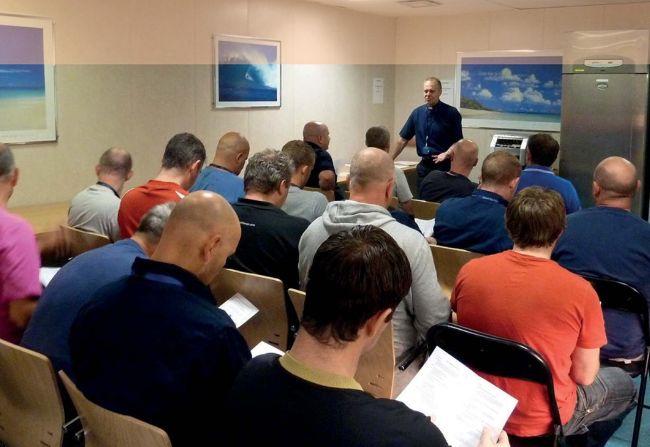
The Rev Craig Gordon taking an offshore act of remembrance
I find it challenging at times but also great fun although one has got to be able to give as much as receive! There are interesting stories – but none I could share with the readers of Life and Work…!” he says.
Though there are a few women working on the rigs, it’s very much a masculine environment, and Gordon’s time spent as a military chaplain with the RAF has stood him in good stead.
“One of my interests during the teenage years was aviation. I wanted to be a pilot. This wasn’t to be but this interest had a massive effect on my future ministry,” he explains.
“When I left school I began work as a trainee site manager with the Darlington Insulation Company. But I was also feeling a strong pull towards the ministry and after four years I started studying for the ministry at Glasgow University in 1981.
“The church has always been part of my family’s life. My grandfather had been an elder in Ibrox and I attended Sunday School, the Junior Section, the Boys’ Brigade and youth groups as I grew up.
“Although church had always been part of my life, faith only became real in 1976 when a group of friends and I joined another group of teenagers from Arthurlie Church in Barrhead to form a ‘Summer Mission Team’ and went to Girvan. The late Very Rev Dr Sandy McDonald and his great friend the Rev John Campbell put together a team and we put on games and services on the beach for a fortnight.
“After breakfast the daily routine was to hold a bible study. This was followed by running games on the beach which concluded with some choruses. After lunch the team would run a beach service for children although a large number of adults usually watched on from the promenade! After this we would have some time off before our evening meal which was followed by activities run for teenagers. 1976 which was the year of the famous heatwave was the year which probably planted a seed deep inside me. I think the last team I participated in was around 1983 by which time I had begun studying for the ministry.
“In 1976, while I remained with the BB at Sherwood my church focus shifted to St Mark’s, which was where the majority of my friends were. We also attended the Young Adults Group on a Sunday Evening and many of us were challenged and had our faith deepened and this is what led me to the ministry – although I was but one among around half a dozen.”
It was then that Gordon’s career varied somewhat from the normal path of finding a parish and settling down.
He was still drawn to aviation and upon leaving university, opted to become a military chaplain.
Gordon says: “When I finished my probationary period I entered the Royal Air Force as a chaplain. I have therefore never been a parish minister. When I was at university and discovered the RAF employed chaplains my old interest in aviation resurfaced and I was delighted to be accepted as an RAF Chaplain. I served for 24 years and view that time as a real privilege. My wife and I have three children, the first was born in England, the second Wales and the third Scotland. Service life suited us and we made a great number of deep friends.
“Military chaplains are seen as an integral part of the service community and it is expected they will go where their people go. My family has lived in England, Wales, Scotland and Germany and through deployments I have been as far afield as the Falklands, Italy, Turkey, Kuwait, Iraq, Afghanistan and the USA. I even spent some time on an aircraft carrier bobbing along on the North Sea which was a taste of things to come!
“One of the great aspects of military chaplaincy is that you are supported and developed over the years. I followed a typical path. My first tour was at RAF Marham in Norfolk. It was a steep learning curve. I conducted 12 funerals in my first year which is a tiny amount compared to my parish colleagues, but the oldest of those commemorated was 34 and the youngest six months. In 1991 the first Gulf War broke out and the squadron I was especially close to lost an aircraft on the first two missions it flew. Thankfully one crew ejected but were taken prisoner but the other crew were killed when they flew into a huge sand dune. These were difficult times for all on the station.
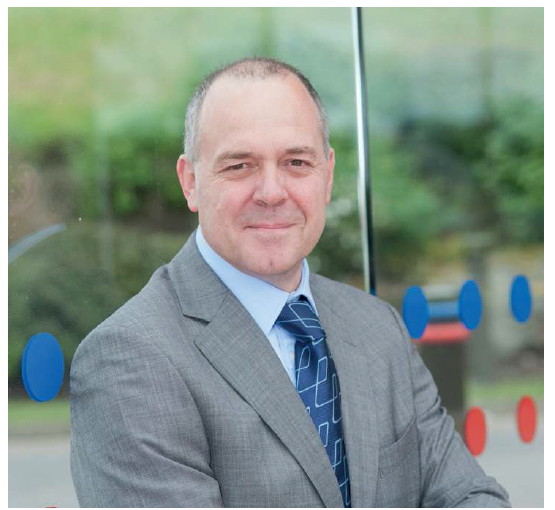
The Rev Gordon Craig
Military chaplains are seen as an integral part of the service community and it is expected they will go where their people go.
“After Marham we went to Wales and then to Lossiemouth. We then enjoyed a lovely tour in Germany which was a terrific place for the family, located within a few miles of the Dutch border and we were able to drive throughout Europe. After Germany I was given my own chaplaincy team and was posted to RAF Cranwell. It was a great experience and one of the highlights of my career. I had a further two tours as a team leader, one at the training unit of RAF Cosford and one with the Harrier Force at RAF Cottsmore/Wittering. From there I ended up in the HQ before escaping for a final tour as Principal of the Armed Forces Chaplaincy Centre at Amport House.”
His involvement with the oil and gas industry began during a meeting of the Committee on Chaplains to HM Forces.
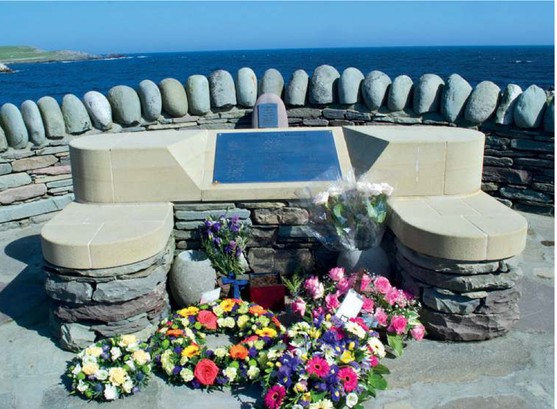
Memorial at Sumburgh to those who have lost their lives in aviation accidents on aircraft transiting through Shetland
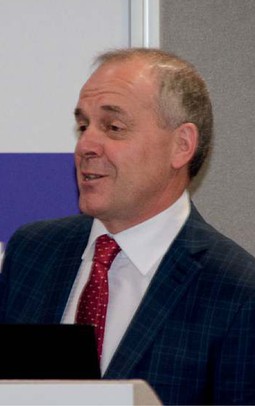
The Rev Gordon Craig speaking at an industry conference on the subject of offshore morale
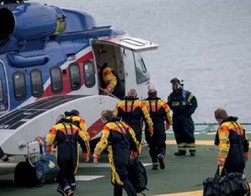
Taking the helicopter offshore
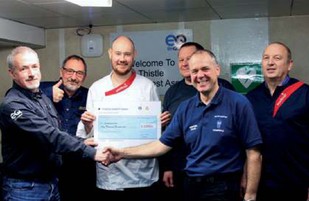
Being presented with a cheque for the trust fund from the crew of the Thistle
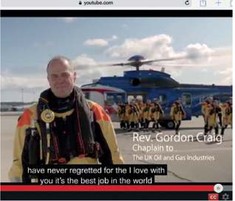
Still from a Church of Scotland video
“I was attending a meeting in Edinburgh along with two of my colleagues from the other two Services. When we entered the room we met Brian Wilkie the Chair of the Trustees responsible for the chaplaincy to the Oil and Gas Industry. He was there to ask if we might advertise the fact that a new chaplain was required and the trustees were keen that the position was advertised within the military chaplaincies. He explained the role and we could see why.
It was a very similar sounding ministry to that of military chaplaincy. I had two years left but over the next few weeks I found myself thinking more and more about the role and decided to test whether this was a calling or not. So I applied and was called forward for interview. At this stage I was still quite happy to be ‘testing the waters’. When the interview process finished that had changed. The time spent in Aberdeen discussing the role and all the possibilities it contained made me certain that this was indeed a call. I left Aberdeen that day hoping I would be called through to a second interview. I was and a few weeks later I returned to Aberdeen feeling a lot more nervous than I had during the first visit! That was the beginning of my involvement with the industry.
“My work revolves around my offshore trips, if possible two trips a month and depending on the frequency of helicopter flights these trips last between two and four days. Every trip is different but I aim to brief the entire crew on the role of the chaplaincy as soon as practical. In particular I inform them of the work of the Oil Chaplaincy Trust Fund.
“This fund provides financial support to UK oil and gas industry workers, past and present, and their direct dependents, who find themselves in a position of hardship through no fault of their own.
“Normally each offshore visit results in at least one application to the Trust – there is normally someone onboard who knows somebody in need. Every month the Trust enables me to meet families the length and breadth of the UK who are facing trying times. The work of the Trust provides an excellent opportunity to build pastoral relationships and reflect the love of God to those facing difficult and harrowing times.”
There’s plenty of variety offshore as well but there are hard times too, when his work requires him to attend to those who have died.
“The hardest part of this ministry is supporting people in their loss. Like chaplaincy in any field the work means you are ministering to people of a working age. People of working age are not meant to die. These days the vast majority of offshore deaths occur as a result of ‘natural causes’. This doesn’t make these tragedies any easier for the families to cope with. At the beginning of the shift they have said goodbye to their loved one in the full expectation that they will be returning soon. Every offshore death is sudden and unexpected and brings with it all the issues surrounding such loss.
“Crews are very tight knit and any offshore death sends ripples through the entire crew.
“Every now and again I make an unscheduled offshore visit to conduct an Act of Remembrance to allow a crew to honour one of their own who has passed away.
“The offshore workforce is a close knit community and when someone dies it has a huge effect on their colleagues. Conducting an Act of Remembrance can be extremely beneficial to all on board.
“The chaplaincy also maintains the industry’s Book of Remembrance and the names of all who die offshore are recorded in the book. I often make home visits to families across the UK to allow them to view their loved one’s details.
“The book is updated once a year, in time for the industry’s annual Service of Remembrance on the first Saturday of November.
“During many months of the year I find myself conducting memorial services commemorating tragic events in the life of the industry. Families travel to Aberdeen to remember loved ones and we hold services in the Kirk of St Nicholas on Union Street, the church which houses the ‘Oil Chapel’ containing our Book of Remembrance.”
“The best part of the job is meeting the people who work in the industry. There is a strong camaraderie among the offshore workforce and their sense of humour is brilliant. It feels very similar to the camaraderie I experienced in the RAF.
“ Every now and again I make an unscheduled offshore visit to conduct an Act of Remembrance to allow a crew to honour one of their own who has passed away.
“There is no typical working week.
“Every offshore visit is unique, every pastoral situation is different. Because my ‘parish’ is the UK I can literally find myself in Southampton on one day and the next Inverness. Many of the offshore workforce live in the Teeside region so I have got to know the Newcastle area quite well. I fly offshore from Aberdeen, Shetland, Norwich and Blackpool so I spend a lot of time in the car – around 35000 miles every year. I am based where the oil companies are based – Aberdeen but the offshore workforce live in all four corners of the UK.
“My pastoral work is usually onshore but is driven by my offshore visits. It is unusual for me to do pastoral work offshore when on a routine visit. However it is during these visits that I pick up on pastoral situations that I am asked to support.
“Generally speaking I work 10 days on and then four off. This essentially means that I have a long weekend every second week. However this is not a hard and fast rule. The offshore visit programme has to take priority and sometimes this routine has to be flexible. The trustees responsible for the chaplaincy are very good at ensuring I take adequate time at home with my family. I find this routine works very well.”